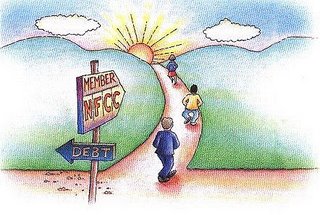Credit counseling (known in the United Kingdom as debt counselling) is a process offering education to consumers about how to avoid incurring debts that cannot be repaid. This process is actually more debt counseling than a function of credit education.
Credit counseling sometimes involves negotiating with creditors to establish a debt management plan (DMP) for a consumer. A DMP may help the debtor repay his or her debt by working out a repayment plan with the creditor. DMPs, set up by credit counselors, usually offer reduced payments, fees and interest rates to the client. Credit counselors refer to the terms dictated by the creditors to determine payments or interest reductions offered to consumers in a debt management plan.
How a Debt Management Program Works
Debt Management Programs (DMPs) traditionally assist consumers with the following types of debt:
* credit cards;
* personal loans (unsecured);
* personal loans secured by household items, such as furniture, appliances, etc.
* past-due balances on telephone bills, cellular phone bills, electric bills, etc., as long as the client no longer resides at the same residence and the debt is for an old and inactive account;
* student loans;
* medical bills;
* repossessions (if the item has been resold and an unpaid balance remains).
Because of the service that DMPs provide, creditors extend certain benefits to the consumers who enroll in them. To qualify for these benefits, creditors require that they receive a certain amount as a structured monthly payment. Each month you would make one simple payment to our organization, and in turn, we will forward the appropriate amounts to your creditors.
The Benefits of a Debt Management Program
Reduced Interest Rates: Creditors will often reduce the interest rates of consumers participating in our DMP. This can be done in one of two ways. Some creditors will do an outright interest rate reduction, meaning that they would reduce the rate to a level established for all consumers who enroll in a DMP. For example, a bank may have a policy of offering a 12% interest rate to all of their cardholders who enter a DMP. Other creditors reserve the right to offer benefits on a case-by-case basis. Clients who meet the creditor’s criteria receive one interest rate, while those who fall short receive a different one.
Source links here
Hot and Sexy New Myanmar Model Shwe Sin| Hot Photo Set
-
Hot and Sexy New Myanmar Model Shwe Sin| Hot Photo Set
The hot photo set of new sexy Myanmar model Shwe Sin. The colors are hot
pink,black and bright yello...






Megan_Fox_6+copy.jpg)









0 comments:
Post a Comment